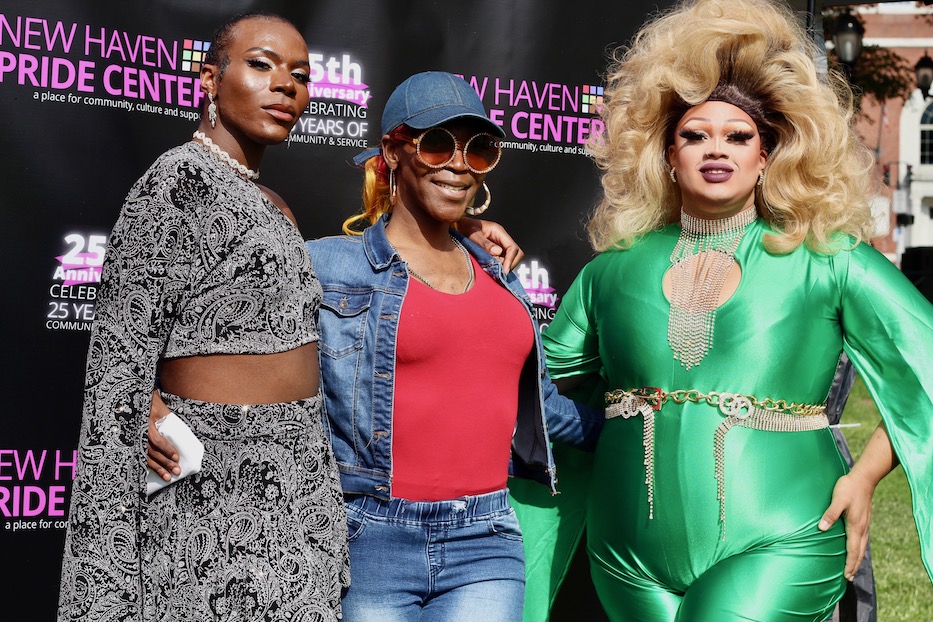
Culture & Community | Dance | Downtown | Drag | LGBTQ | Music | Arts & Culture | New Haven Green | New Haven Pride Center | PRIDE New Haven
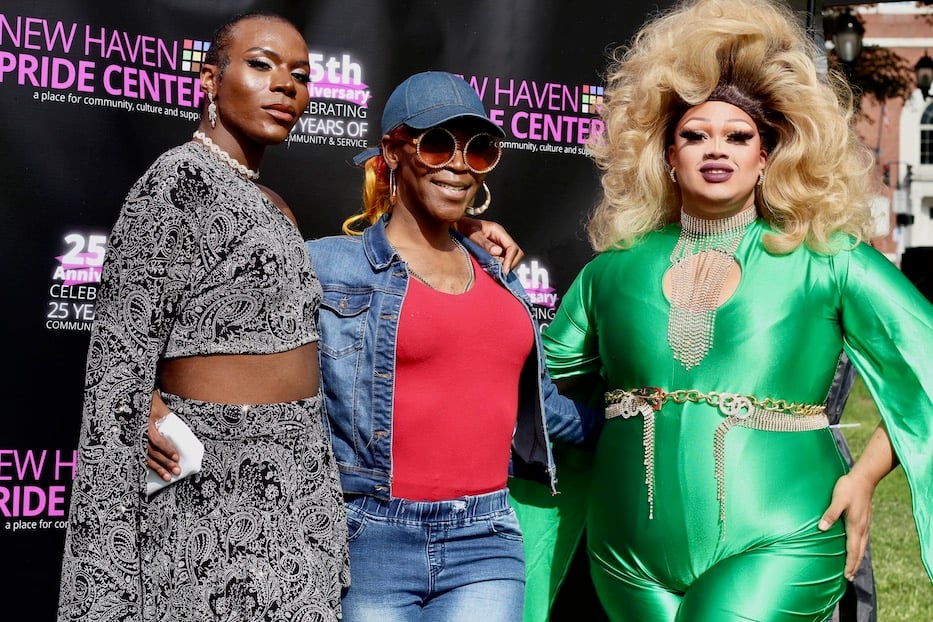
Jehloni, La'Nece Onassis, and Xiomarie LaBeija. Lucy Gellman Photos.
The cheers had already started as Jehloni stepped onto the stage, dripping black and silver. In the audience, his friends cheered, ready for a performance years in the making. The beat dropped and backup dancers appeared, as if to say, you got this, and we got you.
Halfway across the New Haven Green, 14-year-old Angel Rojas fitted a rainbow flag over his shoulders and listened. In every note, he could hear a confirmation: that he was exactly where he was supposed to be, exactly as he was.
A Saturday of joyful firsts—and joyful returns—marked the 24th annual New Haven PRIDEFest, back on the New Haven Green for the first time in over 15 years. For seven hours, dozens of performers, vendors, social service organizations and food trucks gathered in the heart of New Haven, turning the city’s nucleus into a rainbow-patterned celebration. As in past years, it represented the multiplicity of Connecticut’s queer community, from drag queens to pups and their handlers to queer artists who prefer crochet needles and polymer clay to the spotlight.
It also welcomed a number of elected officials, including Gov. Ned Lamont and Lt. Gov. Susan Bysiewicz, State Rep. Pat Dillon, Mayor Justin Elicker, U.S. Sen. Richard Blumenthal and U.S. Rep. Rosa DeLauro. Well over 1,000 attended, according to a crowd estimate from the New Haven Pride Center.
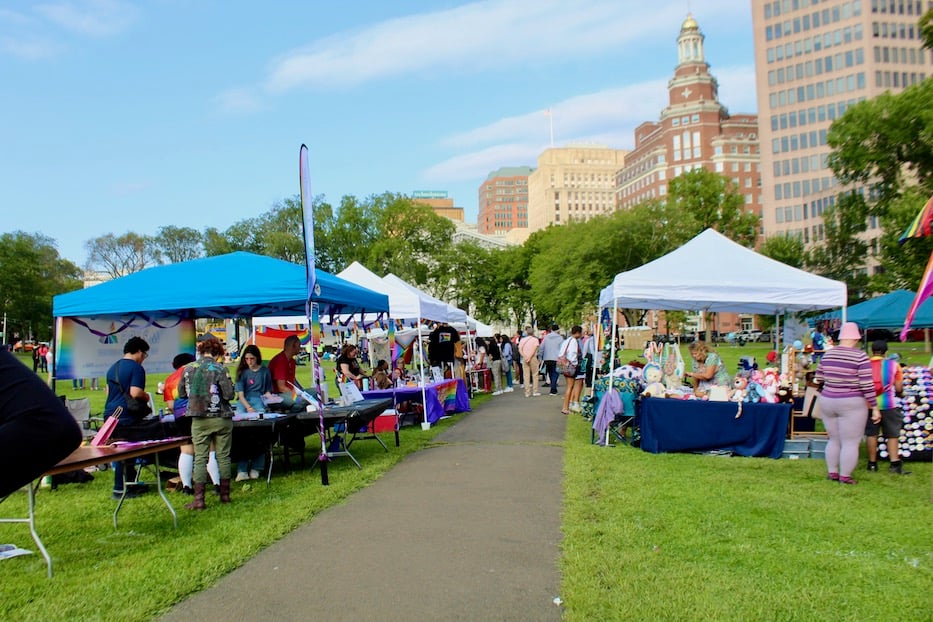
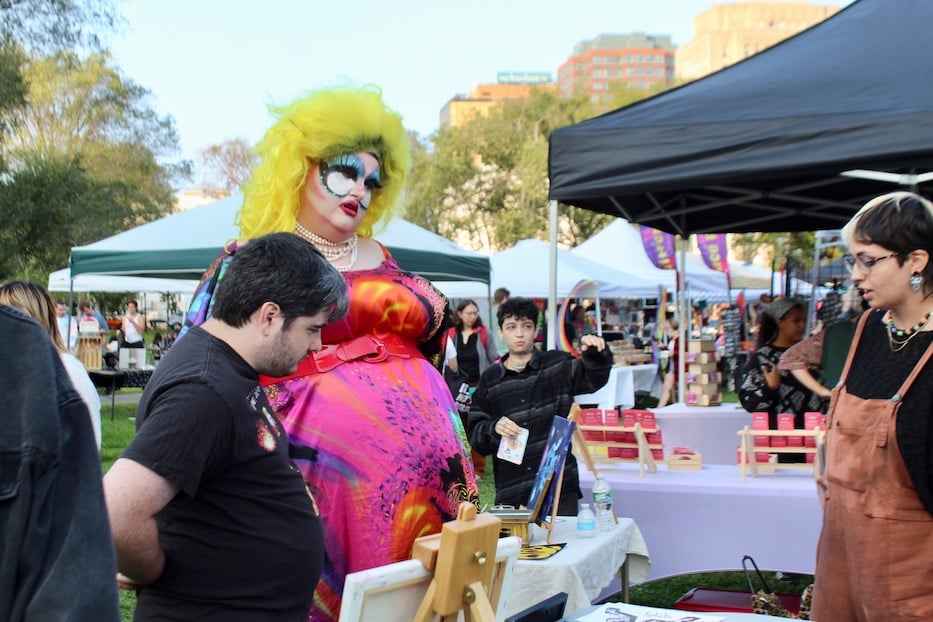
Top: One half of the Green. Bottom: Queen Giganta Smalls checks out the vendor tables. Lucy Gellman Photos.
“I thought it was amazing,” said Patrick Dunn, executive director of the New Haven Pride Center and one of several organizers of PRIDEFest, in a phone call Monday morning. “The Green is the heartbeat of the city of New Haven. It’s the center of everything. You can get there on every mode of public transit you can think of, and ultimately it positions us to be on an equal playing field with the other festivals in the city and the state. The community deserves to be put centerfold in the city for a day.”
From the moment it started, the sense of a long-awaited party was everywhere, from a performer-packed main stage to a Griffin Health tent offering Covid-19 boosters and Monkeypox vaccines. Close to Elm Street, emcees Mz. October May Lay and Crystal Starz glided back and forth across the city’s stage, cheers erupting from an audience as they made it their own. Further back, a sea of vendor tents waited with books, jewelry, voter registration, and even a pole dancing tutorial.
In every direction, bright bands of color flapped in the warm breeze, as if in conversation with Gilbert Baker and his six-stripe banner on the Green’s flagpole. They included not just Daniel Quasar’s popular “Progress Pride” design, but bi- and pansexual pride, asexual pride, blue and pink trans pride, and lesbian pride.
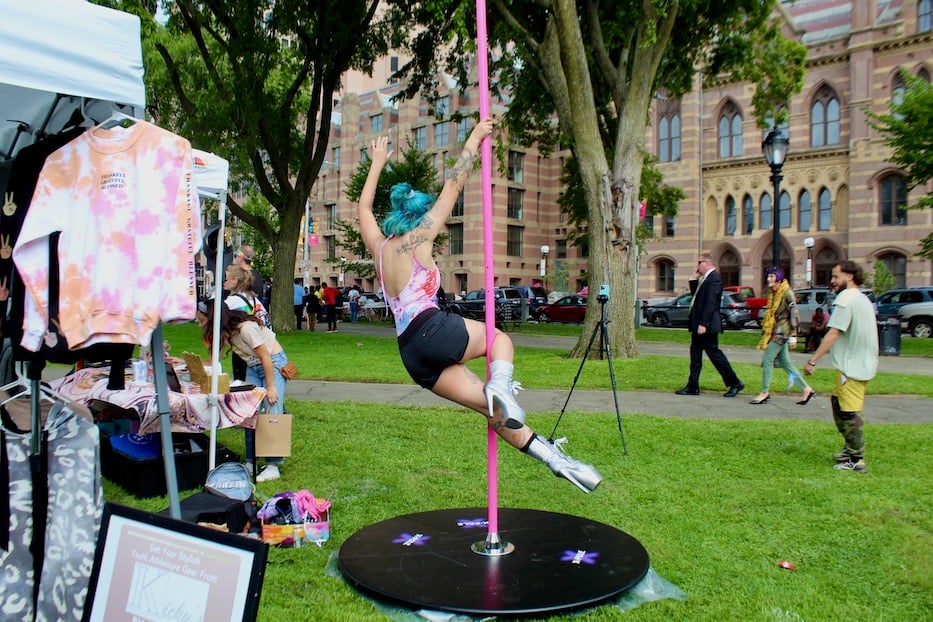
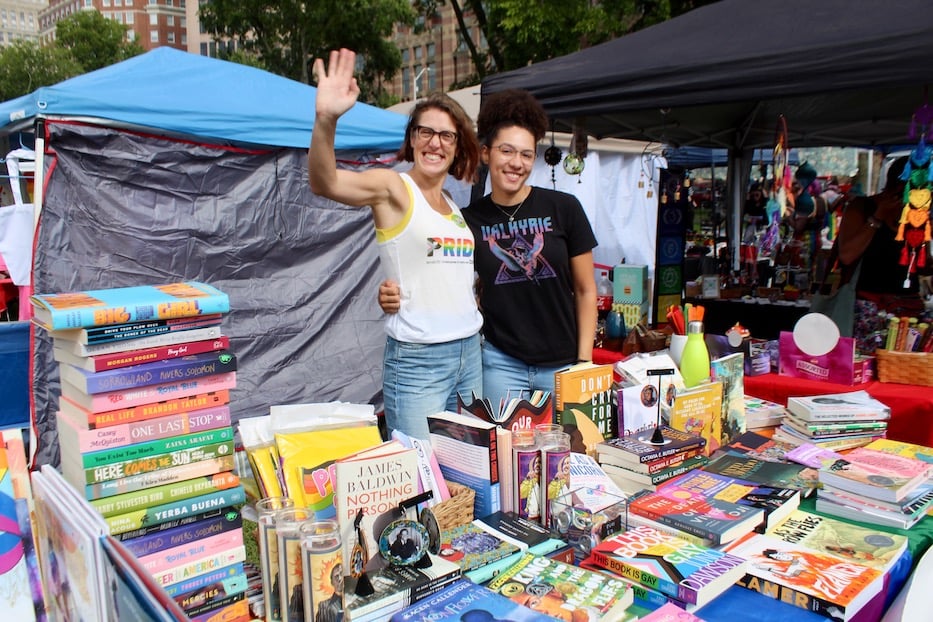
Top: Shani Hines. Bottom: Lauren Anderson and Jada Boggs of Possible Futures Bookshop. Lucy Gellman Photos.
As a slow, sultry cover of Brittney Spears’ “Toxic” drifted over the grass and Tiki Malone took the stage, tattoo artist Shani Hines scoped out their location, a sunny patch of grass directly across from City Hall. They stepped up to a pink pole, and began to twirl around its length. As they moved in time with the lyrics—Too high, can't come down/Losing my head, spinnin' 'round and 'round—a few slack-jawed attendees stopped what they were doing to watch.
Based at the queer-owned, body positive tattoo parlor Earthship Studios in Waterbury, Hines applauded the LGBTQ+ visibility they see in New Haven, not just during Pride celebrations but all year long. As a queer kid growing up in Waterbury, “it was not safe” to be out and loud about their sexuality, they said. After high school, they left the state, traveling from Indiana to Maine to North Carolina, California, and upstate New York in search of chosen family. They ultimately returned to the state “because I had a support system here.”
“We [Earthship Studios] are really looking to connect with New Haven, and really trying to cultivate these relationships,” they said, noting both the social and the economic impact an event like PRIDEFest can have on the state. “It’s important that we do this stuff more often … Connecticut should be pouring billions of dollars into its queer community.”
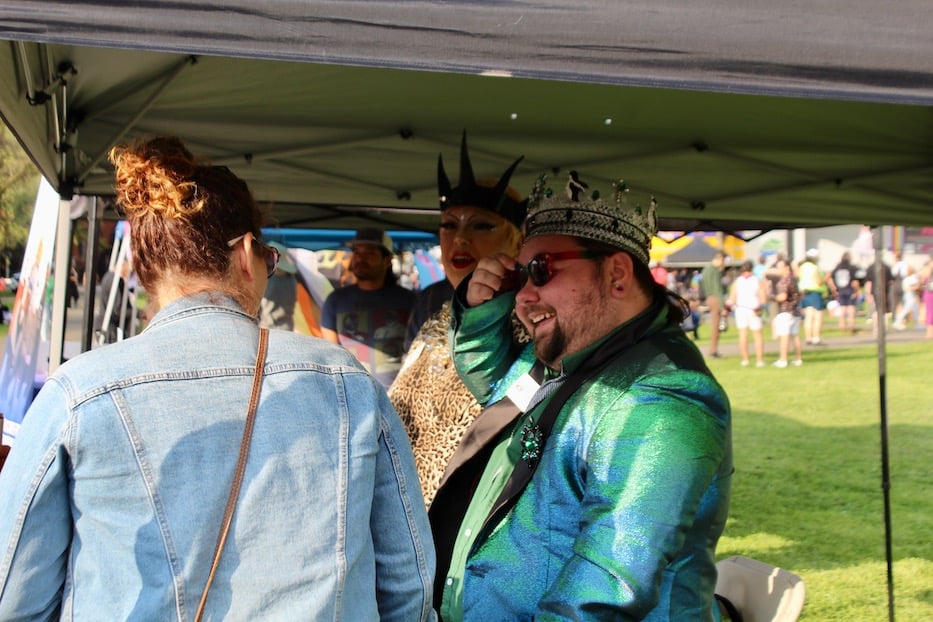
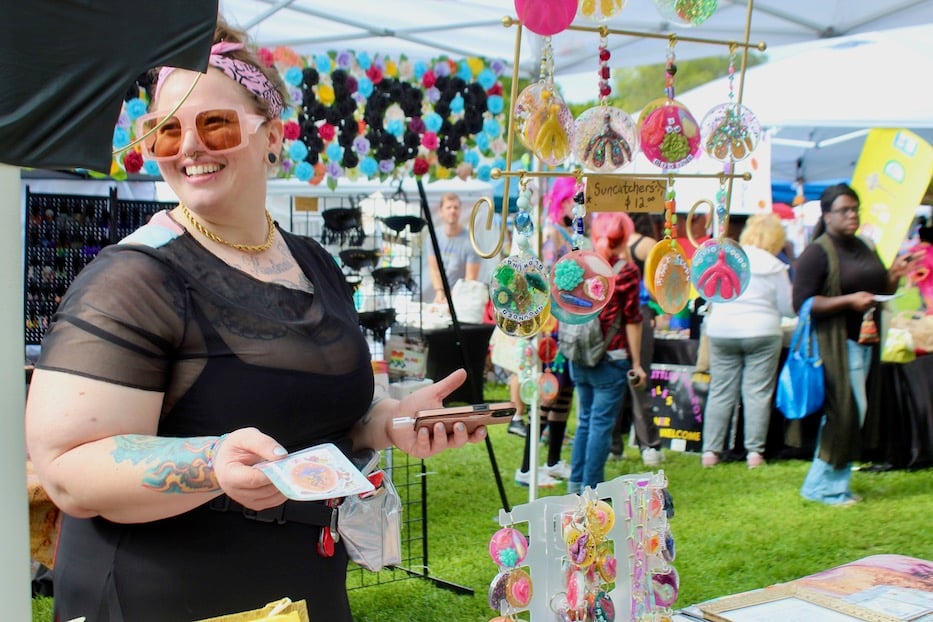
Top: Bryce McKenzie, ruling emperor at the Imperial Sovereign Court of All Connecticut. Bottom: Tattoo artist and F.E.M. Sex Shop's Heather Wiik. Lucy Gellman Photos.
At a tent beside the pole, fellow tattoo artist Heather Wiik said she was grateful for events like Pride—and a chance to talk to people about body and sex positivity in a safe and supportive environment. While working at Earthship=, Wiik took a second job at a local sex store, only to discover “that it was really centered on the male gaze,” she said. Her frustration became the foundation of F.E.M. Sex Shop, a woman-owned, queer-owned business centered on sex positivity and sex toys as self-care for women.
“Being a tattoo artist and being a female and being a large-bodied person, I’m used to navigating masculine spaces,” she said. That doesn’t mean she likes fighting for a right to be in the room, she said. When she isn’t tattooing or running her business, she makes clitoris-themed jewelry, championing an organ that exists solely for pleasure, and is often misunderstood or not taught at all.
Saturday, robust yellow, brown, and peach-colored clitorises peeked out from a rack of suncatchers beside her. If a viewer got close, they could see specks of glitter suspended in the clear resin.
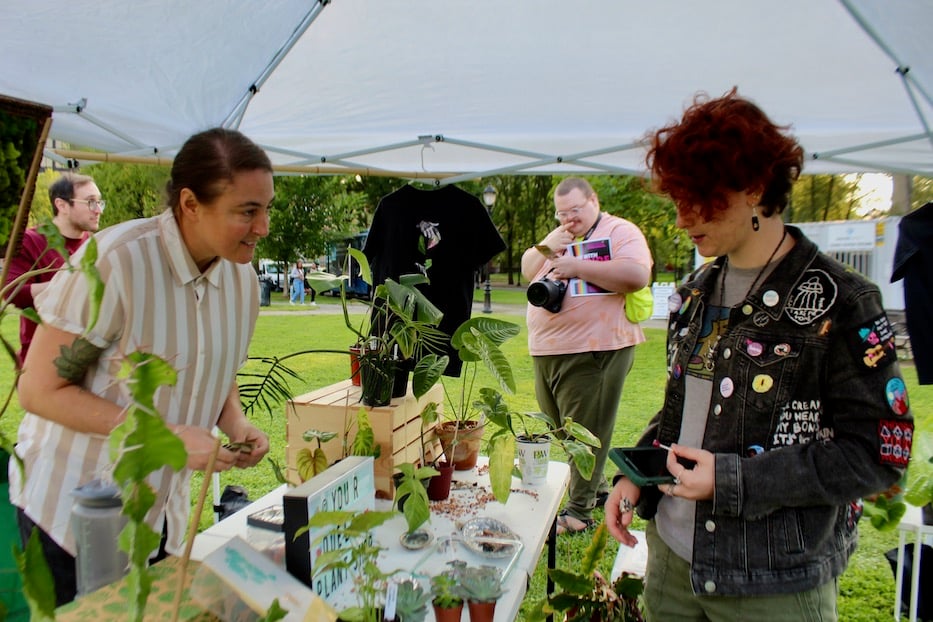
.jpeg?width=933&name=PRIDE2022Green%20-%201%20(1).jpeg)
Top: Your Queer Plant Shop Co-Founder Georgina Gross with Cooperative Arts & Humanities High School junior Hayden Earnshaw. Gross runs the business with fellow co-founder and partner Anika Stewart. Bottom: The artist Jehloni. Lucy Gellman Photos.
Back by the stage, a small crowd had formed as the artist Jehloni prepared his final touches in the wings, beneath an artists’ tent covered with Pride flags for privacy. On the sun-soaked grass, La'Nece Onassis cheered him on, waiting to watch a friend seize a decades-long-held dream. A few feet away, fashion legend Donald Carter prepared for the musician’s unveiling of an outfit he had put together just hours before the show, after talking to Jehloni about his vision the night before.
“I think it’s big,” Onassis said of Pride moving back to the Green. Born in Bridgeport to Haitian parents, Onassis said that it took time for her to find chosen family in Bridgeport and New Haven, and now has no plans to let that family go. “This is huge. It’s important for us to come together. I always tell my sisters here that we have to come together.”
As if on cue, Jehloni stepped onto the stage in a two-piece outfit, drawing cheers as attendees studied a single, wide and shimmering pant leg and flared half-skirt at the right hip. Sinking into a crouch, the singer lifted the mic, drawing out the lyrics of his “Need You” while looking out over the crowd, and then further back over the green. As he sang, dancers Jan Rosello and Jaylyn Rogers floated onto the stage, a whirr of constant motion. As Jehloni flowed into “Don’t Care,” the two came down from the stage, arms raised above their heads, and danced jubilantly among members of the crowd. A video of that performance is at the bottom of the article.
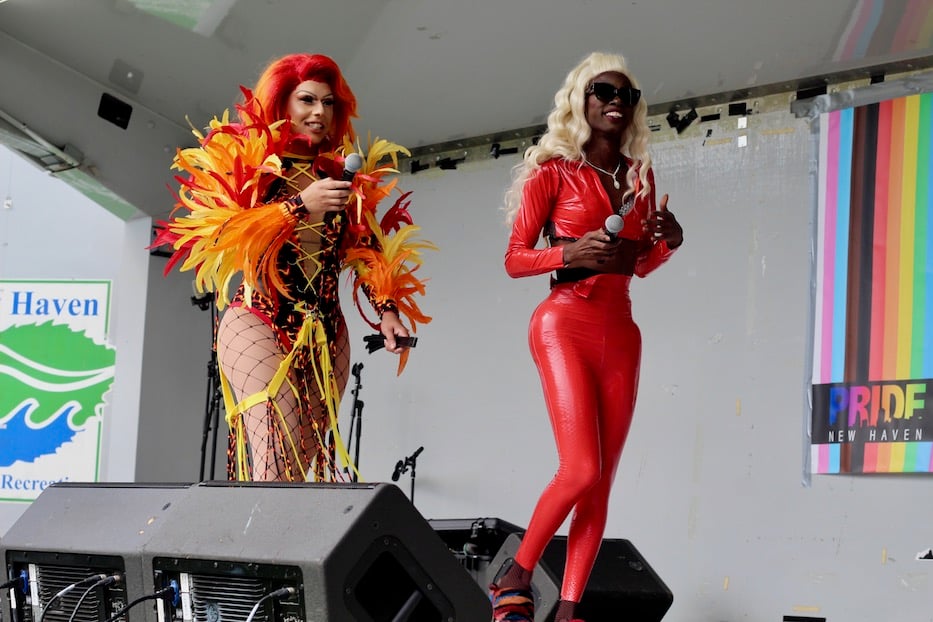
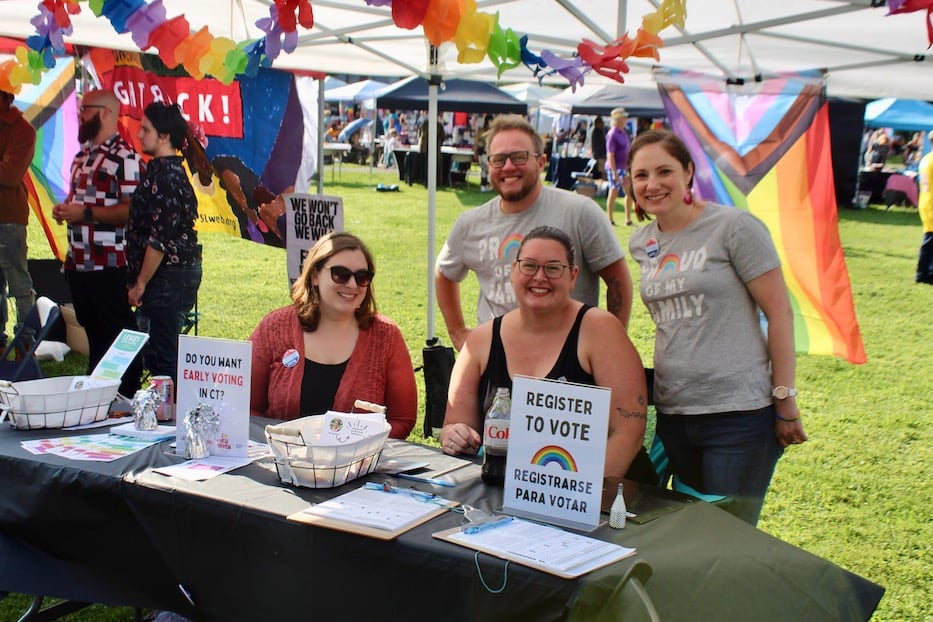
Top: Hosts Crystal Starz and Mz. October May Lay. Bottom: Janna King, Ethan Balk, Lesley Heffel McGuirk, and Mara Balk at a table registering people to vote. Heffel McGuirk is an unaffiliated candidate running against incumbent Rep. Patricia Dillon in the 92nd district. Lucy Gellman Photos.
For both the 22-year-old artist and those watching, it marked a personal milestone. Born and raised in New Haven, the artist started singing as a small child, but hadn’t performed publicly until Saturday. Growing up in the city, “it was rough, but it was honestly not as bad as everyone thinks it is,” Jehloni said. As a kid and later a young adult at James Hillhouse High School, he embraced his feminine side—which sometimes made it hard to fit in.
“It was interesting being a gay kid, just growing up and trying to discover myself, really it just trying to become me,” he said after performing, as Sister Funk took the stage and began to rock out. “It was a challenge to really find the representation I had growing up. I was that gay boy that wore a full face of makeup to school, and I was like, ‘I don’t care what anybody says. I don’t care. Walking through the hood and everything. I’m gonna live my life and I’m gonna do what I want.’”
He found his closest friends, including Rosello, on the Hillhouse track team—so much so that it became a support system. Three years ago, Jehloni started making music while also developing a craft in makeup artistry. While some members of his family have struggled to accept who he is, “it’s just learning the art of not giving a fuck,” he said. In the front row Saturday, a few of his aunts and uncles came out to support, and cheered for the whole performance.
“You know, when it gets dark, just keep going,” he said. “I really used to just sit in my darkness sometimes, and I realized that’s just not for me. I can’t keep being stagnant within my own emotions.”
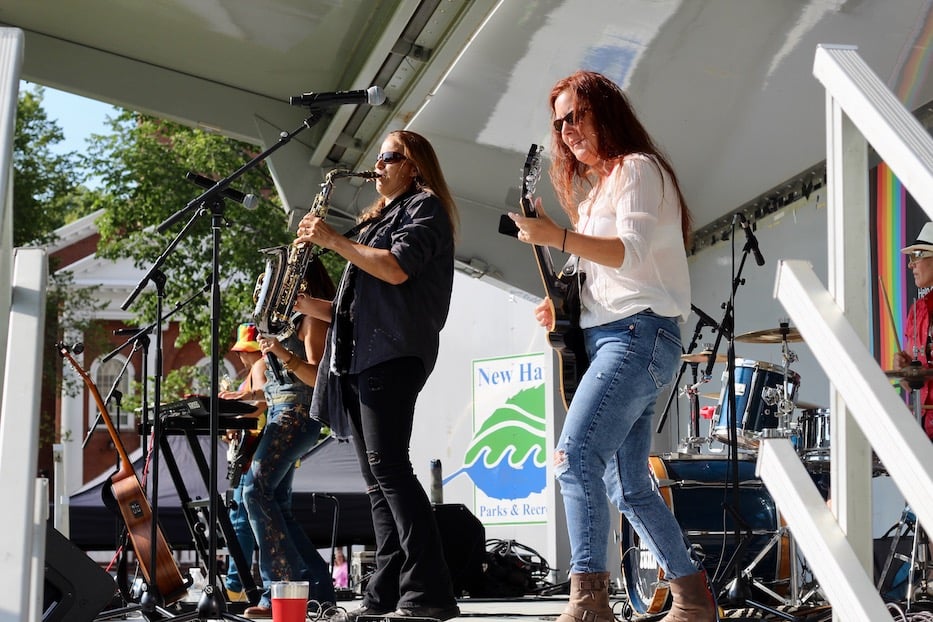
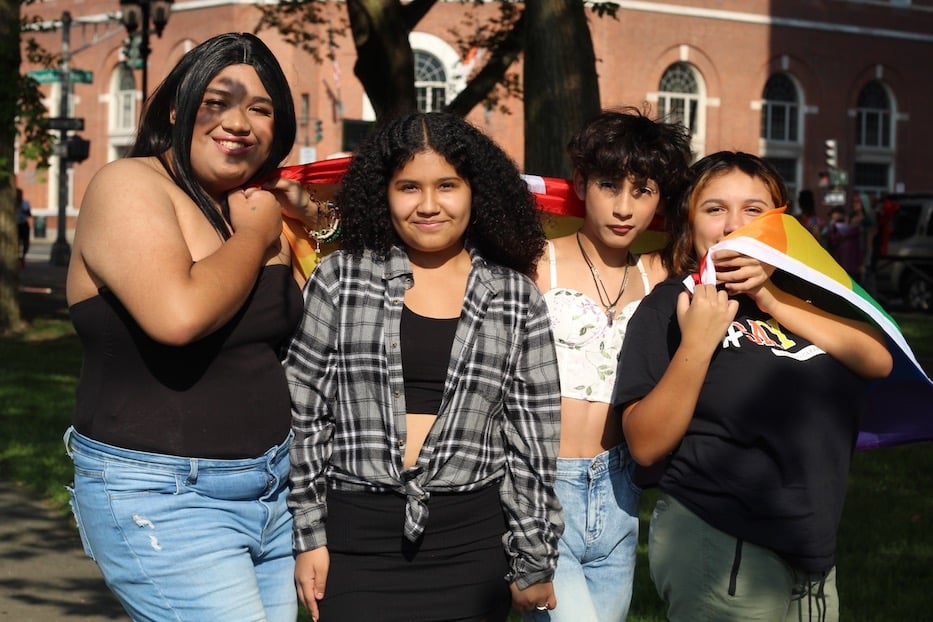
Top: Sister Funk. Bottom: Friends Chris Arsata, Jailen Ocampo, Angel Rojas and Desmaray Baez. Lucy Gellman Photos.
Across the grass, 14-year-old Angel Rojas pricked up his ears, and stopped to listen. Last year, he came out to his friends and family for the first time. This September, “I wanted this to be my first Pride,” he said. He called reinforcements just in case the crowd felt judgy: his friends Desmaray Baez, Jailen Ocampo and Chris Arsata and mom Jessica Ramirez. In the lead-up to Saturday, his friends pooled their resources to surprise him with a shimmery blue crop top, with small, delicate flowers embroidered across the chest and torso.
Angel knew he was gay before he had the terminology for it, he said Saturday. As a kid, he preferred his sister’s Barbie dolls and games of dress up to anything his male peers suggested. As he got older, he learned that there was a word for what he was feeling. When he came out to his parents, they were both accepting. After starting Saturday nervous that people would judge his outfit and makeup, Angel said he was comfortable in his own skin.
Watching him chat with his friends, Ramirez called it a sort of full-circle moment, in which she got to be the kind of support system she wished for as a kid. As the child of Mexican parents, “I couldn’t be myself,” she said. When she came out as bisexual in her teens, her parents wouldn’t accept it. It meant a young adulthood spent back in the closet, after trying to break free of it.
When Angel came out to her, there wasn’t even a second of hesitation, she remembered. “I told him to just be yourself.” When he turned 14, she threw him a Pride-themed party and invited his friends and family. Saturday, she began to cry as she remembered watching him tell her mother—and her mother wrapping him in a hug in return. She’s glad to see her mother get that do-over, she said through tears.
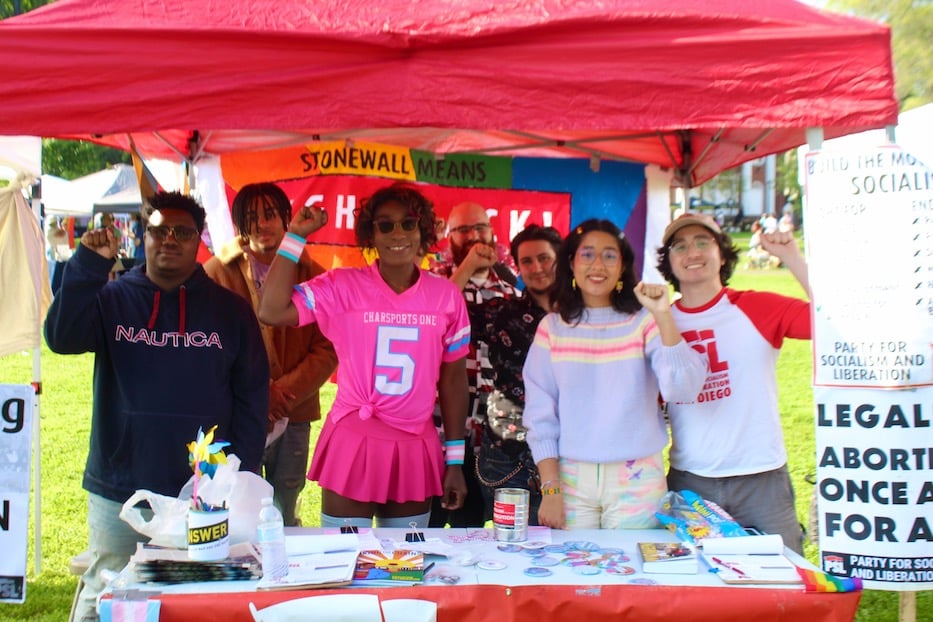
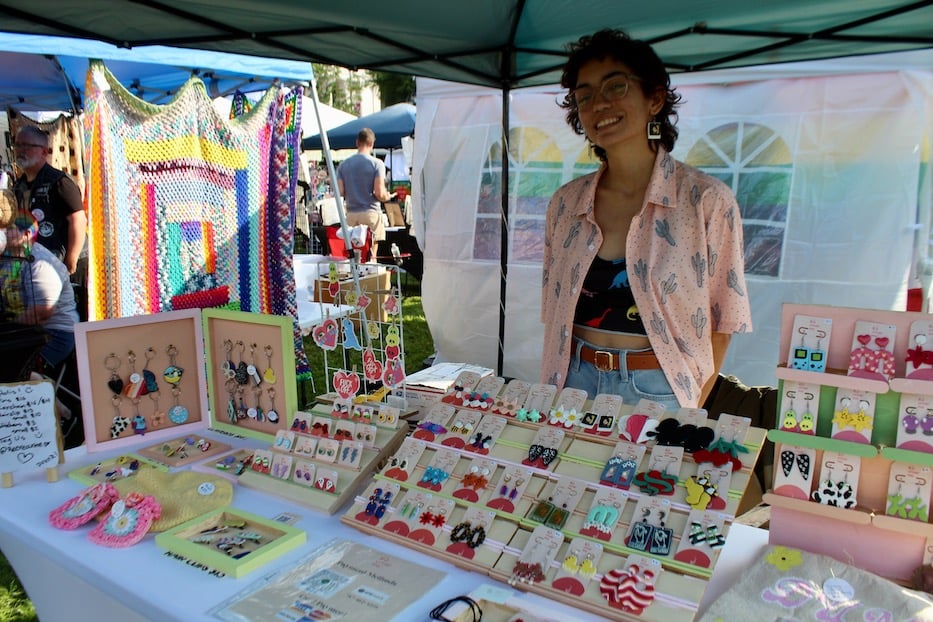
Top: Karleigh Chardonnay Webb (in pink jersey and matching skirt) with fellow members of PSL. Bottom: Paola Rivera. Lucy Gellman Photos.
Beneath the shade of their tents, many of the vendors and attendees also championed that visibility—and stressed the importance of safe queer community in a year of mounting anti-LGBTQ+ attacks. Repping the Party for Socialism and Liberation (PSL), LGBTQ+ activist and journalist Karleigh Chardonnay Webb said she was both celebrating the day, and using it as fuel for an ongoing fight.
For years, she has watched as legislators turn LGBTQ+ rights into a moral and religious battle ground. Connecticut has been no stranger to those attacks, from a lawsuit trying to bar young trans women from athletic competition to gubernatorial candidate Bob Stefanowski’s announcement of an anti-trans “Parental Bill of Rights” earlier this month.
“We’re back, and we need this right now,” she said. “To Bob Stefanowski, I say, how dare you try to step your way into the governor’s mansion on the backs of trans youth?”
Nearby, first-time vendor Paola Rivera listened as Elicker took the stage, and declared that the day was not just an occasion to gather, but “about human rights.” A recent transplant from the mountainous town of Aibonito, Puerto Rico, “I decided to do something new” with her art when she moved to Connecticut last year, and started playing with polymer clay. The result is her business Recrearme, now based in Berlin, Conn.
Last year, Rivera said, she left the island after a frustration with the government reached a boiling point. In Connecticut, she’s still trying to build a network of friends. She still loves the island, she added—just from afar for now. On the inside of the forearm, a hibiscus flower burst into bloom above the Taíno coquí and a minimalist Puerto Rican flag.
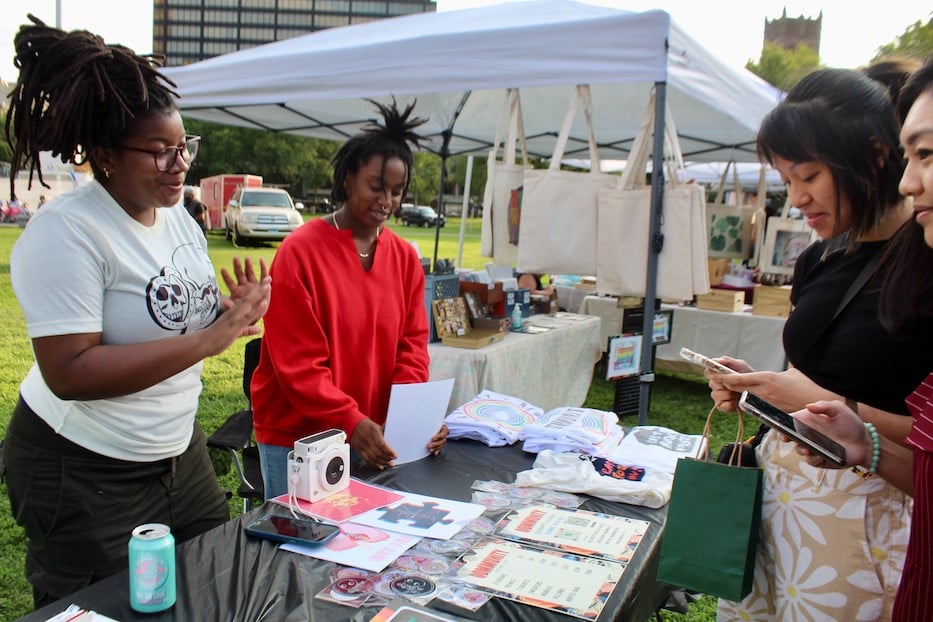
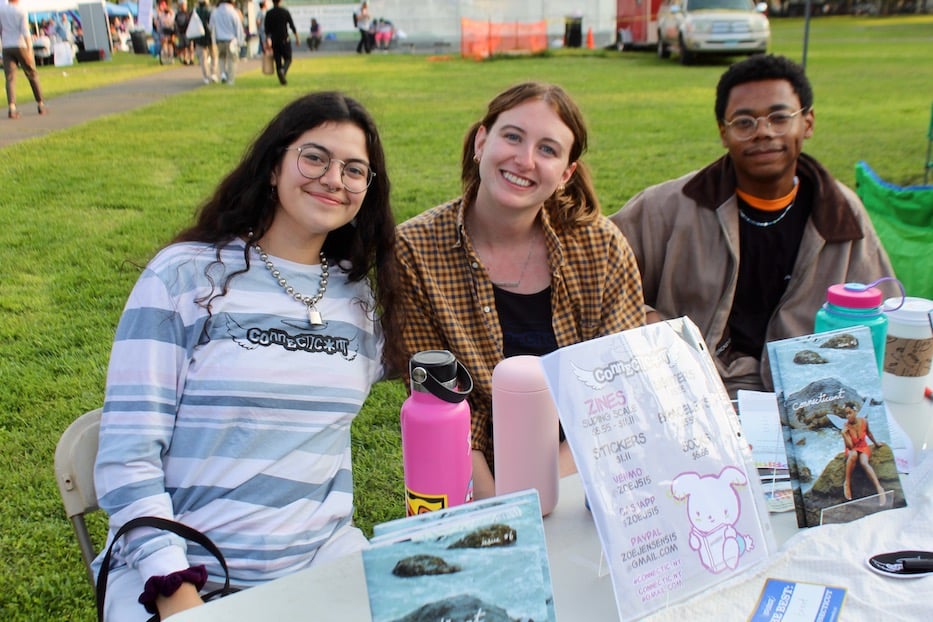
Top: Ashley LaRue and Makeda Snow at a table for Qommunity. Bottom: Members of the Connectic*nt crew: Mar Pelaez, Zoe Jensen, and Richard Adger. Lucy Gellman Photos.
Across the Green, attendees found at least one vendor for every possible need, from a tutorial on walking and menopause to books by giant of queer literature. At a station for Qommunity, founder Ashley LaRue said she’d almost sold out of her merch—and was excited to also be at her first Pride as a vendor and a queer business owner. Describing herself as “gay as hell,” she looked to the day-long fest as a rare and special chance to be in community with other queer people of all ages in the center of the city.
“We don’t get a lot of queer gathering spaces outside of bars and clubs—which is why Qommunity is a thing, which is why East Rock House is a thing,” said LaRue, who grew up in New Haven’s Hill neighborhood and moved back to the city after her studies at UConn. “This is nice.”
Even the placement felt sweet, she added: her table sat next to a booth from Connectic*nt. As she vended, she got help from friend and fellow business owner Makeda Snow. Snow, founder of Makeda Bead & Soul, had thought about selling at Pride, but hesitated, she said. After seeing what the event was about, she’ll be back next year.
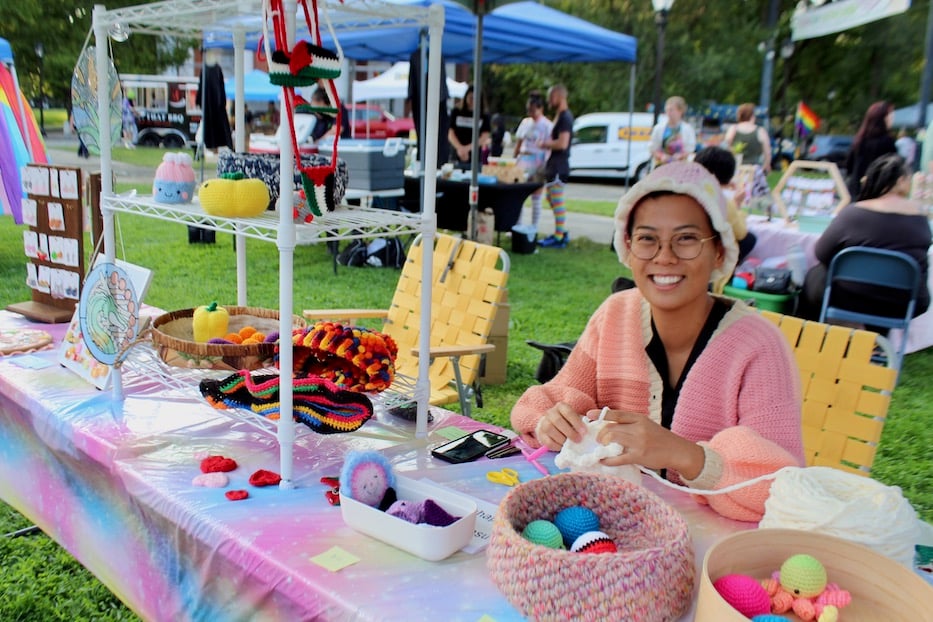
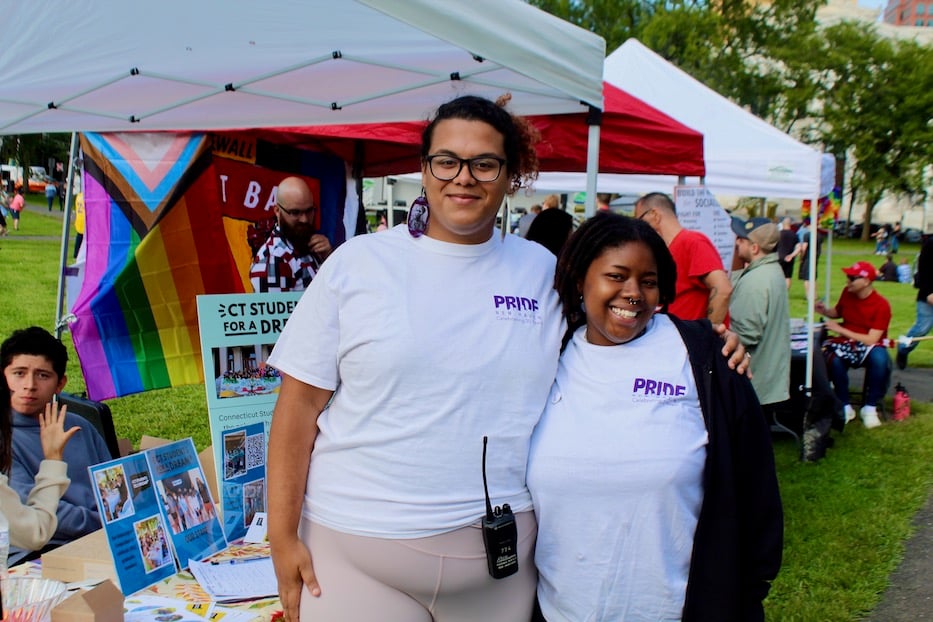 Top: Artist Tiffany Hsu, who is an ER nurse by day and a crochet artist by night. Bottom: New Haven Pride Center Producer Jahnice Cajigas and Jamila Washington. Lucy Gellman Photos.
Top: Artist Tiffany Hsu, who is an ER nurse by day and a crochet artist by night. Bottom: New Haven Pride Center Producer Jahnice Cajigas and Jamila Washington. Lucy Gellman Photos.
Tiffany Hsu worked quietly on a soft crocheted ghost, its eyes facing out at attendees as they walked by. After catching the crochet bug five years ago during their time in New York City, Hsu turned it into a daily practice, keeping it up when they moved to New Haven in early 2020. In the pandemic, it has become a tool for stress relief outside of their full-time day job as an emergency room nurse. Saturday marked their first time selling their work, an array of tiny crocheted Pokeballs and cartoon characters to bright hats.
“This has been incredible,” they said. “Everyone has been incredibly kind.”
Back on stage, Xiomarie LaBeija appeared in a tall, strawberry blonde wig and shining, silky green jumpsuit. On the walkway nearby, Angel made sure that the rainbow flag he’d brought was big enough to cover his friends, sitting on their shoulders like a bright superhero cape. At the tent for Griffin Health, another vaccine went into another arm.
It seemed like there were cheers and hellos and hugs everywhere, as friends ran into each other after too long away. Pride showed no sign of stopping.
To learn more about the New Haven Pride Center visit their website.

